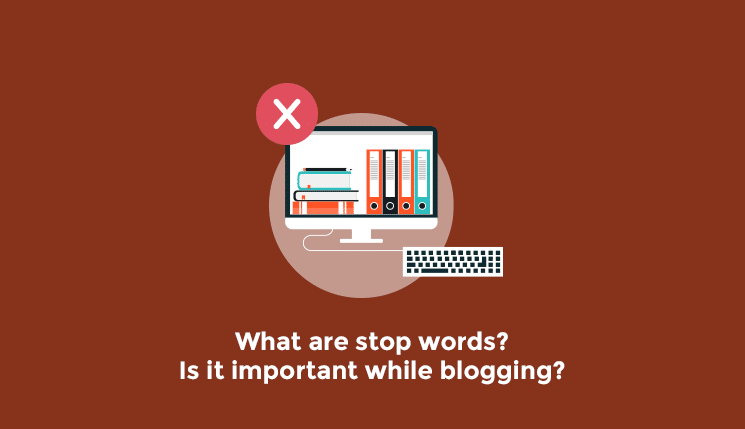
Have you come across with the term “stop words” yet? If yes, you are an SEO freak, for sure. So you may be well aware that the stop words will be harmful when a blog post is being optimized for Google.
For any newbie here, let me introduce about SEO stop words.
What are stop words and what will happen when optimizing for Google?
Some words will be ignored or filtered (partially or completely) by the search engines. These words called stop words and it constitutes about a quarter percent of the blogs online. No definite list of stop words has been found which all tools use and there is no such filter that has been used. But there are some tools to avoid them specifically for phase search support.
In order for a given purpose, any group of words can be listed as stop words. There are some common function words like at, is, the, on, which for some search engines. In this situation, problems may arise due to stop words when theses are included in the phrase and search for them especially in names like ‘The The’, ‘Take That’, ‘The Who’ etc. where as in other case, in order to improve the performance some search engines remove “want” from the query. As a general rule, they remove some of the most common words including lexical words.
Google maintains a stop word list to be ignored or filtered out. The list goes like this:
- I
- a
- about
- an
- are
- as
- at
- be
- by
- com
- for
- from
- how
- in
- is
- it
- of
- on
- or
- that
- the
- this
- to
- was
- what
- when
- where
- who
- will
- with
- the
- www
source: www.ranks.nl/stopwords. This is the list that has been used recently. The list was long before.
Why stop words are getting ignored by search engines?

Think if you don’t need a word to get the ultimate results you desire. What will you do? You will ignore the word. Isn’t it? Similarly, since the stop words impart some issues like server load problems and ambiguity and they don’t have any role in retrieving the results, search engines filter it out. It also doesn’t make a sense to remove stop words from search queries and their results too.
You will be clearer if this is supported with an example.
If your blog post @yoursite(example).com/keyword-ranking is ranking for a keyword, “what is meant by keyword-ranking” then it would definitely rank for “what is keyword-ranking’ too as you may expect that. The word “is meant by” is the stop word here.
A lot of time can be saved by search engines by ignoring these stop words.
Will search engines consider stop words as useful ever?
Even though search engines filter out stop words in most of the cases, there are chances where they are not being filtered if there is a difference in the meaning. In some situations, removing a stop word will make the entire search query meaningless. It is then the stop word won’t be removed.
In a nutshell, a search engine is quite wise in deciding whether to ignore stop words or not. When is query is released, the search engine interprets the meaning by analyzing the words besides main keywords and in some cases stop words can also act as LSI keywords or main keywords.
Let’s go ahead with an example:
Mask: object worn on face
The Mask: Movie
In this case, the stop word is “the”. The search engine considers this stop word as the meaning will be different if it filters out.
How search engines differentiate between the stop words to be filtered or not?
Cool!! This is a good question.
A list of phrases is maintained by the search engines in which the stop words should not be ignored. When considering the stop words and without considering, if the search results are different, Google includes those questions to their exceptional list. This happens at the same time when the user searches a query.
alsoRead
For some of your queries, Google displays results which are irrelevant results. Isn’t it? In that case, stop words are being ignored by the search engines when it is required.
Does stop words have anything to do with SEO?

“Removing stop words hurt SEO”. If you have ever read this statement before which is commented by any SEO experts or Yoast plugin by WordPress, it is not completely true anyways. They say adding stop words in Blog title, Blog URL, your ranking of blog posts in SERPs will be lowered.
But there are many bloggers who don’t even bother the stop words and rank high on Google.
If you want your blog post URL to look cleaner, it is not advisable to do this default in your permalink settings either. Why the experts say it actually hurts SEO is that the URL or title without stop words may read differently. For example, /what is speaking ability/ is not the same as /what speaking ability/. It is better to remove it manually if it sounds good, otherwise not.
Always, Google focuses to enhance user experience. When the words are filtered out, the user experience may be affected at times.
Don’t you think stop words add beauty to the sentences? Yes, it does.
Conclusion
So what shall we conclude? To use stop words or not? Here is the simple answer. If a blog title sounds good without a stop word, you can ignore that stop word. If the results by adding stop words and without adding them looks different, then it is for sure Google considers those stop words in your title too. Therefore, stop words are not ‘must-ignored’ words. But if it is used excessively, it may hurt SEO. As far as Google is concerned, it is quite better to use stop words limitedly without using unnecessarily is the best option.
“Make your blog URL and title self-explanatory, you will be ranked higher”
Aviv Digital is one of the leading digital marketing training institutes in Calicut, Kerala. We offer a wide variety of globally recognized certification programs that include SEO, SEM, SMM, Email Marketing and Inbound Marketing courses. For more details, Contact us at: +91 9037 489 577







